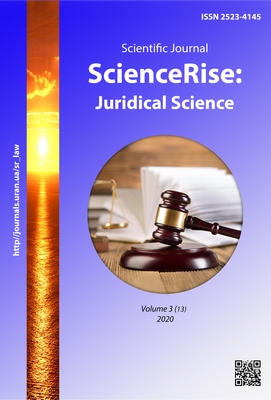Features of communication of the victim in criminal proceedings in the form of private prosecution
DOI:
https://doi.org/10.15587/2523-4153.2020.214105Keywords:
criminal proceedings, criminal procedural communication, victim, private prosecution, refusal of the victim to prosecuteAbstract
The article is devoted to the study of certain aspects of communication of the victim in criminal proceedings in the form of private prosecution. It is noted, that the procedure of criminal proceedings in the form of private prosecution is almost not regulated by Chapter 36 of the CPC, as the norms that should regulate it are either absent or contained throughout the CPC. Therefore, the development of proper legal regulation of private prosecution as a separate proceeding is a topical industry issue.
This, in turn, requires a significant revision of the basic foundations of normative regulation of the victim in criminal proceedings in general, including the rights of the victim, his/her procedural status at all stages of criminal proceedings, the starting mechanism to ensure the legal rights and interests of the victim during criminal proceedings.
It is stated, that in order to protect the rights and legitimate interests of the victim in criminal proceedings, the law should provide for the possibility of initiating criminal proceedings (pre-trial investigation) in the form of private prosecution in case, when the victim is unable to bring an application in action by own will. In this regard, it is proposed to amend Part 1 of Art. 477 of the CPC, paragr. 2 part 7 art. 55 of the CPC
References
- Pro vnesennia zmin do Kryminalnoho ta Kryminalnoho protsesualnoho kodeksiv Ukrainy z metoiu realizatsii polozhen Konventsii Rady Yevropy pro zapobihannia nasylstvu stosovno zhinok i domashnomu nasylstvu ta borotbu z tsymy yavyshchamy (2017). Zakon Ukrainy No. 2227-VIII. 06.12.2017. Available at: https://zakon.rada.gov.ua/laws/show/2227-19#Text
- Yanovska, O. H. (2013). Osoblyvosti kryminalnykh provadzhen u formi pryvatnoho obvynuvachennia za novym Kryminalnym protsesualnym kodeksom Ukrainy. Chasopys Kyivskoho universytetu prava, 1, 242–245.
- Osinska, O. M. (2016). Problemni pytannia nabuttia osoboiu protsesualnoho statusu poterpiloho v kryminalnomu protsesi Ukrainy. Visnyk KhNUVS, 4 (75), 96–101.
- Torbas, O. O. (2015). Vidmova poterpiloho vid obvynuvachennia yak pidstava zakryttia kryminalnoho provadzhennia. Aktualni pytannia derzhavotvorennia v Ukraini. Kyiv: Print-Servis, 442–444. Available at: http://dspace.onua.edu.ua/handle/11300/7702
- Smyrnov, M. I. (2013). Osoblyvosti kryminalnoho provadzhennia u formi pryvatnoho obvynuvachennia. Vprovadzhennia novoho Kryminalnoho protsesualnoho kodeksu Ukrainy v pravookhoronnu diialnist ta navchalnyi protses: dosvid ta shliakhy udoskonalennia. Kharkiv: KhNUVS, 64–68.
- Perepelytsia, S. I. (2013). Osoblyvosti protsedury sudovoho rozghliadu kryminalnoho provadzhennia u formi pryvatnoho obvynuvachennia za novym KPK Ukrainy. Yuryst Ukrainy, 3 (24), 93.
- Ugolovno-protsessualnii kodeks Federativnoi Respubliki Germaniia. Available at: https://publishup.uni-potsdam.de/opus4-ubp/frontdoor/deliver/index/docId/6039/file/sdrs02.pdf
- Code de procédure pénale (2020). Available at: https://www.legifrance.gouv.fr/codes/texte_lc/LEGITEXT000006071154
- Tlepova, M. I. (2016). Protsesualne stanovyshche poterpiloho pid chas dosudovoho rozsliduvannia. Kharkiv, 23. Available at: http://nauka.nlu.edu.ua/download/diss/Tlepova/a_Tlepova.pdf
- Alenin, Yu. P. (Ed.) (2018). Kryminalnyi protsesualnyi kodeks 2012 roku: ideolohiia ta pravozastosuvannia. Odessa: Vydavnychyi dim «Helvetyka», 321–346.
- KPK Respubliky Kazakhstan (2014). Available at: http://online.zakon.kz/Document/?doc_id=1008442
- KPK Respubliky Bilorus (1999). Available at: http://pravo.by/world_of_law/text.asp?RN=hk9900295
Downloads
Published
How to Cite
Issue
Section
License
Copyright (c) 2020 Inna Mudrak

This work is licensed under a Creative Commons Attribution 4.0 International License.
Our journal abides by the Creative Commons CC BY copyright rights and permissions for open access journals.
Authors, who are published in this journal, agree to the following conditions:
1. The authors reserve the right to authorship of the work and pass the first publication right of this work to the journal under the terms of a Creative Commons CC BY, which allows others to freely distribute the published research with the obligatory reference to the authors of the original work and the first publication of the work in this journal.
2. The authors have the right to conclude separate supplement agreements that relate to non-exclusive work distribution in the form in which it has been published by the journal (for example, to upload the work to the online storage of the journal or publish it as part of a monograph), provided that the reference to the first publication of the work in this journal is included.









